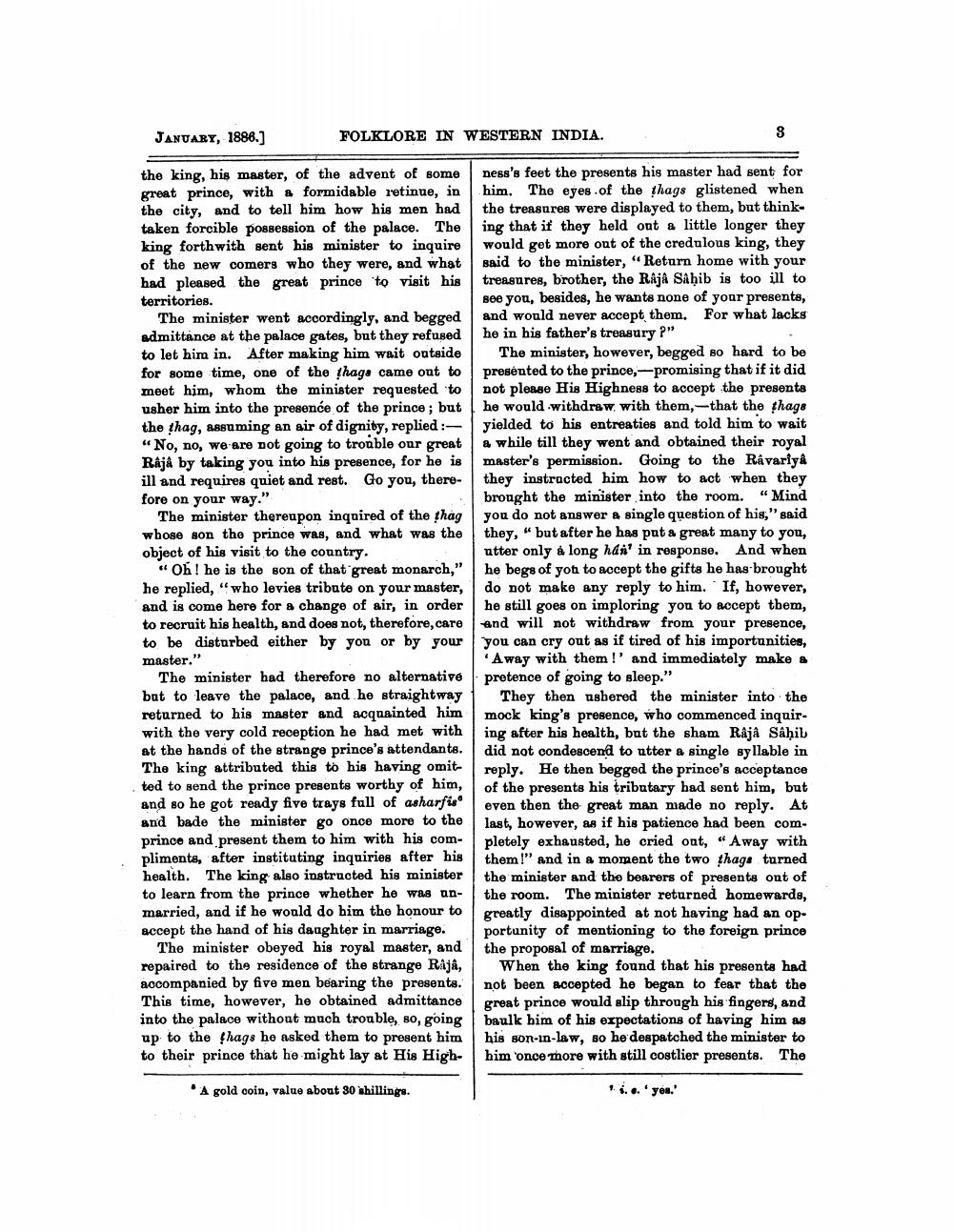________________
FOLKLORE IN WESTERN INDIA.
JANUARY, 1886.]
the king, his master, of the advent of some great prince, with a formidable retinue, in the city, and to tell him how his men had taken forcible possession of the palace. The king forthwith sent his minister to inquire of the new comers who they were, and what had pleased the great prince to visit his territories.
The minister went accordingly, and begged admittance at the palace gates, but they refused to let him in. After making him wait outside for some time, one of the thags came out to meet him, whom the minister requested to usher him into the presence of the prince; but the thag, assuming an air of dignity, replied:"No, no, we are not going to trouble our great Raja by taking you into his presence, for he is ill and requires quiet and rest. Go you, therefore on your way."
The minister thereupon inquired of the thag whose son the prince was, and what was the object of his visit to the country.
"Oh! he is the son of that great monarch," he replied, "who levies tribute on your master, and is come here for a change of air, in order to recruit his health, and does not, therefore, care to be disturbed either by you or by your master."
The minister had therefore no alternative but to leave the palace, and he straightway returned to his master and acquainted him with the very cold reception he had met with at the hands of the strange prince's attendants. The king attributed this to his having omitted to send the prince presents worthy of him, and so he got ready five trays full of asharfis and bade the minister go once more to the prince and present them to him with his compliments, after instituting inquiries after his health. The king also instructed his minister to learn from the prince whether he was unmarried, and if he would do him the honour to accept the hand of his daughter in marriage.
The minister obeyed his royal master, and repaired to the residence of the strange Râjâ, accompanied by five men bearing the presents. This time, however, he obtained admittance into the palace without much trouble, so, going up to the thags he asked them to present him to their prince that he might lay at His High
A gold coin, value about 30 shillings.
8
ness's feet the presents his master had sent for him. The eyes of the thags glistened when the treasures were displayed to them, but thinking that if they held out a little longer they would get more out of the credulous king, they said to the minister, "Return home with your treasures, brother, the Raja Sahib is too ill to see you, besides, he wants none of your presents, and would never accept them. For what lacks he in his father's treasury ?"
The minister, however, begged so hard to be presented to the prince,-promising that if it did not please His Highness to accept the presents he would withdraw with them,-that the thags yielded to his entreaties and told him to wait a while till they went and obtained their royal master's permission. Going to the Râvariya they instructed him how to act when they brought the minister into the room. "Mind you do not answer a single question of his," said they, "but after he has put a great many to you, utter only à long han' in response. And when he begs of you to accept the gifts he has brought do not make any reply to him. If, however, he still goes on imploring you to accept them, and will not withdraw from your presence, you can cry out as if tired of his importunities, 'Away with them!' and immediately make a pretence of going to sleep."
They then ushered the minister into the mock king's presence, who commenced inquiring after his health, but the sham Raja Sâhib did not condescend to utter a single syllable in reply. He then begged the prince's acceptance of the presents his tributary had sent him, but even then the great man made no reply. At last, however, as if his patience had been completely exhausted, he cried out, Away with them!" and in a moment the two thags turned the minister and the bearers of presents out of the room. The minister returned homewards, greatly disappointed at not having had an opportunity of mentioning to the foreign prince the proposal of marriage.
When the king found that his presents had not been accepted he began to fear that the great prince would slip through his fingers, and baulk him of his expectations of having him as his son-in-law, so he despatched the minister to him once more with still costlier presents. The
4.6.' yea.'




